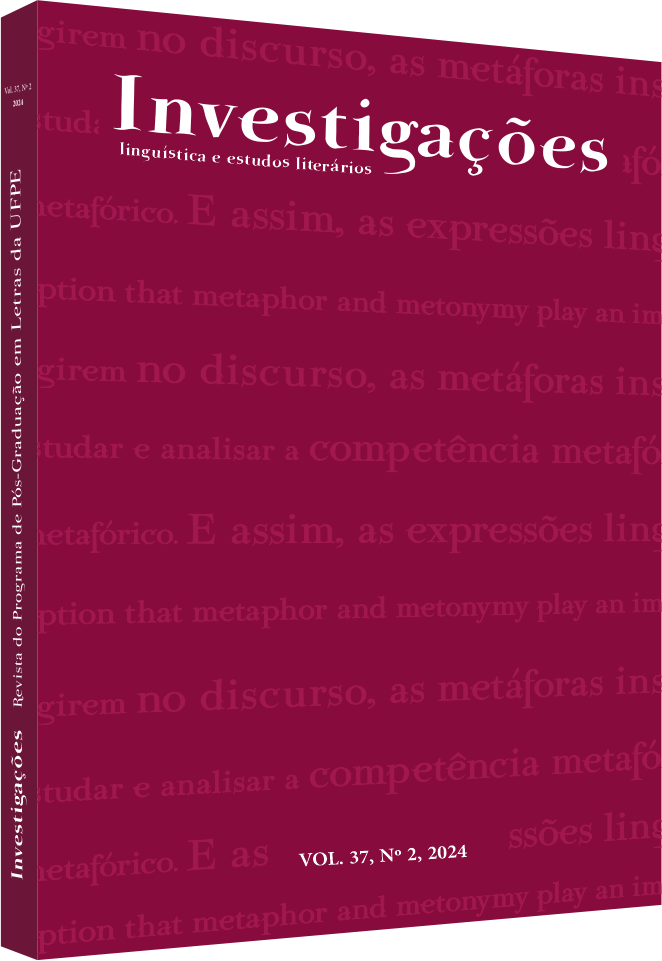Happiness in the classroom in times of crisis : the role and contribution of literary tales
DOI:
https://doi.org/10.51359/2175-294x.2024.263728Keywords:
hapiness, literature, tales, schoolAbstract
Contemporary social crises urge us to find ways to resist them. Among the possible avenues, we wonder how school and literature could contribute to forming truly happy human beings. Specifically, we have four main objectives: to analyze the role of literature in times of crisis; to observe literary texts as sources of creativity and reflexivity; to show that the notion of happiness encompasses several literary genres; and to study the importance of the fairy tale genre in the classroom. These reflections will be enriched by the works of Hétier (2021), Coelho (2008), Defays (2014), among others.
References
BACH. Richard. Fernão Campelo Gaivota. Rio de Janeiro: Record, 2015.
BAQUÉ, Joël. La fonte des glaces. Paris: Folio, 2019.
BASS, Rick. Le livre de Yaak. Paris : Gallmeister, 2016.
BETTELHEIM, Bruno. A Psicanálise dos Contos de Fadas. Rio de Janeiro: Paz e Terra, 1978.
BRASIL. Ministério da Educação. Base Nacional Cumum Curricular. Brasília: MEC, 2018.
CANDIDO, Antônio. Vários escritos. 4. ed. Rio de Janeiro: Ouro sobre azul, 2004.
COELHO, Nelly. Novaes. O conto de fadas: símbolos, mitos, arquétipos. São Paulo: Paulinas, 2008.
CORINNE BLOUIN, Christine Lande. L’importance du conte dans une situation pédagogique. Empan, nº 100, p. 183 à 188, 2015. Disponible sur: https://www.cairn.info/revue-empan-2015-4-page-183.htm.Consulté le 05 novembre 2023.
CRAPON, Isabelle. ; WENTZEl, Bernard. Créativité et réflexivité : vers une démarche innovante de formation des enseignants. Revue Française de Pédagogie, nº 197, 2016. Disponible sur: https://journals.openedition.org/rfp/5147.Consulté le 05 novembre 2023.
DEFAYS, Jean-Marc ; DELBART, Anne-Rosine ; HAMMAMI, Samia et al. La littérature en FLE : État des lieux et nouvelles perspectives. Paris : Hachette, 2014
DRUON, Maurice. O menino do dedo verde. 2020. Rio de Janeiro: José Olímpio, 2020.
ELIADE, Mircea. Le sacré et le profane. Paris : Folio, 1987.
FERRIER. Michaël. Fukushima: récit d’un désastre. Paris: Gallimard, 2012.
HÉTIER, Renaud. Créer un espace éducatif avec les contes merveilleux : comment penser le conflit. Lyon : Chronique sociale, 2017.
HÉTIER, Renaud. L’humanité contre l’Anthropocène. Résister aux effondrements. Paris : PUF, 2021.
HISTOIRE de deux amis. KT42 – Portail catholique pour le café. Disponível em: https://www.kt42.fr/2017/01/conte-pour-le-pardon-blessures-et.html.
JEAN-FRAÇOIS. La soupe aux cailloux. Disponível em: https://papapositive.fr/conte-soupe-cailloux-bonheur-partage-enfants/.
L’INSTANT présent. Philosophie Spiritualité. Disponível em : http://www.philosophie-spiritualite.com/contes/contes12.htm.
LA chair de la langue. Atelier Lumiere D’etoiles. Disponível em: https://atelierlumieredetoiles.fr/2013/11/10/la-chair-de-la-langue-conte-swahili/.
LE puissant seigneur. Podcastics. Disponível em : https://www.podcastics.com/podcast/episode/le-puissant-seigneur-un-conte-pour-reapprendre-a-semerveiller-41307/.
LE tailleur de Pierre. Caçadores de Lendas. Disponível em: https://cacadoresdelendas.com.br/japao/o-conto-do-cortador-de-pedras/.
MÃE, Walter Hugo. As mais belas coisas do mundo. Rio de Janeiro : Globo, 2019.
MATHIEU, Nicolas. Leurs enfants après eux. Paris: Actes Sud, 2018.
MEIRELES, Cecília. A arte de ser feliz. Revista Prosa Verso e Arte. Disponible sur https://www.revistaprosaversoearte.com/a-arte-de-ser-feliz-cecilia-meireles/. Consulté le 13 février 2024.
MEIRELES, Cecília. Viagem. Disponible sur https://www.ebooksbrasil.org/adobeebook/viagem.pdf. Consulté le 13 de fevereiro de 2024.
MOUNTOUMNJOU, Samuel. [S. l. : s. n.], 2020. 1 vídeo (8 min). Publicado pelo canal Santillana Français. Disponível em: https://www.youtube.com/watch?v=eh3KF4Zd23A.
PERROW, Susan. Histórias Curativas para Comportamentos Desafiadores. São Paulo: Antroposófica, 2013.
PETIT, Michelle. A arte de ler ou como resistir à adversidade. São Paulo: Editora 34, 2009.
PLATIEL, Suzy. « Le conte et l’oralité comme outils d’éducation et de lien social : l’approche de Suzy Platiel ». Disponible sur : https://apprendreaeduquer.fr/conte-outil-deducation-suzy-platiel/ Consulté le 19 avril 2024.
RICHINITTI, Gabriela Eward. Literatura: o potencial humanizador da mais solitária das artes. Criação & Crítica, n. 28, p., dez. 2020. Disponible sur: http://revistas.usp.br/criacaoecritica. Consulté le 05 de junho de 2023.
SAINT-EXUPÉRY, Antoine de.. Le petit Prince. Paris : Gallimard, 2007.
SALL, Mamadou. Le diable et la beauté. Conte moi. [S. l.]. Disponível em : https://www.conte-moi.net/contes/diable-et-beaute.
XYPAS, Rosiane. A Leitura subjetiva no ensino da Literatura. Olinda : Nova Olinda, 2018.
Downloads
Published
How to Cite
Issue
Section
License
Copyright (c) 2024 Simone Pires Barbosa Aubin

This work is licensed under a Creative Commons Attribution 4.0 International License.
Authors who publish with Revista Investigações agree to the following terms:
Authors retain copyright and grant the journal right of first publication with the work simultaneously licensed under the Creative Commons Attribution 4.0 International (CC BY 4.0) license that allows others to share the work with an acknowledgement of the work's authorship and initial publication in this journal.
Authors are able to enter into separate, additional contractual arrangements for the non-exclusive distribution of the journal's published version of the work (e.g., post it to an institutional repository or publish it in a book), with an acknowledgement of its initial publication in this journal.
You are free to:
Share — copy and redistribute the material in any medium or format for any purpose, even commercially.
Adapt — remix, transform, and build upon the material for any purpose, even commercially.
The licensor cannot revoke these freedoms as long as you follow the license terms.
Under the following terms:
Attribution — You must give appropriate credit , provide a link to the license, and indicate if changes were made . You may do so in any reasonable manner, but not in any way that suggests the licensor endorses you or your use.
No additional restrictions — You may not apply legal terms or technological measures that legally restrict others from doing anything the license permits.

